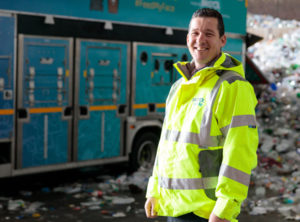Binning batteries safely saves lives

Binning batteries safely saves lives
We have released a shocking video showing the dangers of putting batteries in the wrong bin.
The film shows a fire breaking out at the Albert Road depot caused by flammable items, such as batteries and gas canisters, being wrongly placed with cans and plastic recycling.
We have seen a rise in instances of fires, seven in 2022. All have been caused from flammable items being wrongly put in the recycling. Learn more about what goes where in Bristol’s kerbside collections.
Please take empty gas canisters to the recycling centre. Place your used battery and electrical items into an untied clear plastic bag inside your black box.
Battery fires can endanger the public and crews by causing fires on streets and in waste centres.
Impact of binned batteries and gas canisters
Batteries contain heavy metals including lead, mercury, zinc and lithium – all of which can be recycled and used to make new batteries and other products. However, when they end up in the wrong place, batteries can cause fires which are hard to extinguish.
If batteries, or electricals containing batteries, are not properly separated they can end up being crushed in the waste and recycling process. This increases the chances that they will be punctured and self-combust, setting fire to the surrounding dry and flammable waste and recycling. Batteries are also harmful to the environment if they end up in the ground.
Steve Quinton, Risk Reduction Area Manager at Avon Fire & Rescue Service, said:
“Lithium-ion batteries are found in many of our everyday household items, such as phones, laptops and even e-cigarettes. While they are not dangerous when used properly, they can present a significant risk if they are not disposed of correctly.
“We’d encourage you to follow the advice from Bristol Waste and dispose of your batteries safely. Keep yourselves and those working at our recycling centres safe from fire. Remember, in an emergency, always call 999.”
How to recycle your battery and gas canister
We are calling on Bristol residents to make sure they are recycling these items safely, and never putting them in the wheelie bin. That means placing them in a clear bag and putting it in the black recycling box.
We are also asking for people to check for ‘hidden batteries’ that are inside small electrical items such as disposable e-cigarettes, toothbrushes, shavers, chargers and toys. Batteries in these items need to be removed. If not possible, place them in a separate, clear, untied bag and place with the black recycling box for collection as a small electrical item.
Lucy Edgar, SHEQ Director at Bristol Waste, said:

“Batteries are filled with precious materials that can go on to have a new life if recycled properly. When they are put in the wrong place, they can be lethal.
“They should be placed in a clear bag and placed in the black recycling boxes. The clear bag stops them getting wet and ensures our crews can clearly see what they are”.
Binned batteries cause fires
Lithium-ion batteries are responsible for around 48% (over 200) of all waste fires occurring in the UK each year according to the Environmental Services Association. This costs some £158 million annually to waste operators, fire services and the environment.
Craig Powell, Contract Manager, Processing for Bristol Waste, who was onsite when the fire in the film broke out said:
 “We heard the explosion, which is when you see the debris fly in the air, within seconds there were flames. We we’re lucky with this one; the fire systems we have in place ensured it was controlled before it became too big. However, these types of fires, if we were on a residential street, could cause untold damage.
“We heard the explosion, which is when you see the debris fly in the air, within seconds there were flames. We we’re lucky with this one; the fire systems we have in place ensured it was controlled before it became too big. However, these types of fires, if we were on a residential street, could cause untold damage.
“People think because they are empty or flat, cannisters and batteries are safe. However, they act like little bombs, which are surrounded by dry flammable recycling – it’s really dangerous. But keeping us all safe is simple. Just separate your batteries and places them in a clear, untied bag in your black recycling box, and take cannisters to the recycling centre.”
